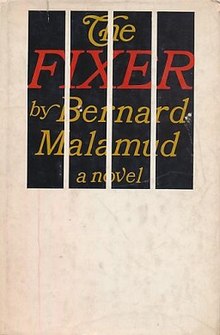The Fixer (Malamud novel)

First edition
|
|
| Author | Bernard Malamud |
|---|---|
| Country | United States |
| Language | English |
| Publisher | Farrar, Straus & Giroux |
|
Publication date
|
1966 |
| Media type | |
| Preceded by | Idiots First (1963) |
| Followed by | Pictures of Fidelman (1969) |
The Fixer is a novel by Bernard Malamud published in 1966 by Farrar, Straus & Giroux. It won the U.S. National Book Award for Fiction (his second) and the Pulitzer Prize for Fiction.
The Fixer provides a fictionalized version of the Beilis case. Menahem Mendel Beilis was a Jew unjustly imprisoned in Tsarist Russia. The "Beilis trial" of 1913 caused an international uproar and Russia backed down in the face of world indignation.
The book was adapted into a 1968 film of the same name starring Alan Bates (Yakov Bok) who received an Oscar nomination.
The novel is about Yakov Bok, a Jewish handyman or "fixer". In 1911, while living in Kiev without official papers, Bok is arrested on suspicion of murder when a Christian boy is killed during Passover. Jailed without being officially charged and denied visitors or legal counsel, Bok is treated poorly and interrogated repeatedly in the hopes he will confess to killing the boy as part of a Jewish religious ritual. Among other things, he is asked about his political views, and replies that he is apolitical. Bok also tries to explain to his captors that though he was born Jewish, he is not a religious man. During his many months in prison, he has time to contemplate his sad life and human nature in general. Part of Bok's torment is the knowledge those who attempt to help him are subjected to harassment and/or arrest by the government. After his father-in-law bribes a guard to allow him to speak with Bok, the prison guard is arrested and incarcerated. Bok's main advocate and supporter, Investigating Magistrate Bibikov, is arrested on trumped-up charges after visiting Bok in prison. Bibikov is kept in solitary confinement until he eventually commits suicide. The only person permitted to visit Bok is his wife, who left him just before the novel began. She is only permitted to visit him because she promised to get him to sign a statement confessing to the murder of the Christian boy; ultimately Bok refuses to sign the statement because he did not commit the crime. It is during his wife's visit that he learns of his father-in-law's death and of his wife's child from her ex-lover. It is through his suffering Bok finally finds it in his heart to forgive his former wife and agrees to claim her bastard child as his own in order to help her regain respectability within the Jewish community.
...
Wikipedia
